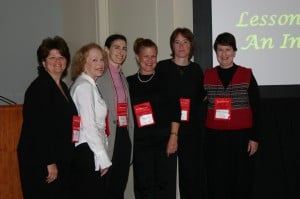
At the National Conference for Social Studies in 2006: Gail Flax, Mickey Held, Elena Baum, Ronnie Cohen, India Meissel, and Debbie MacInnes.
The year 2012 has been one of highs and lows for the Holocaust Commission. The highs include the integration of our new What We Carry program into our educational offerings, and the lows last January as we lost two of our Speakers’ Bureau survivors, David Katz and Hanns Loewenbach, of blessed memory.
Without exception, every one of the Holocaust Commission’s programs is geared toward students and their teachers—even Yom Hashoah, where we award exceptional educators and student writers and artists for their work. The educators we work with are our direct link to the students who need to heed the lessons of the Holocaust. Every once in a while there are teachers who stand out even among their dedicated and talented peers in making our mission their own. The Commission recently lost one such ally on the forefront of Holocaust education in our area, when long time Lakeland High School English teacher Debbie MacInnes lost her two-year battle with cancer last month.
Debbie had been a dedicated participant in Holocaust Commission programming. In 2004 she encouraged her colleague, India Meissel, a social studies teacher at Lakeland, to apply for the Esther Goldman Award for Excellence in Holocaust Education (from the Holocaust Commission), as India had begun to work on an innovative interdisciplinary program for Holocaust studies. They attended their first Yom Hashoah commemoration that spring as India received the award.
The Commission sent India to the Facing History in Ourselves conference in Boston as part of her prize, and Debbie, intrigued by the idea of the interdisciplinary program, decided to go with India and take the course “on her own dime.” That week of coursework inspired Debbie to change her English class assignments to teach 11th grade, so she could work with India developing the interdisciplinary program.
In 2006, thanks to their collaboration, India was named the National Council of Social Studies’ Teacher of the Year. Several Holocaust Commission members proudly went to Washington, D.C. to see the two of them lead a seminar for teachers from across the United States on the program they had fashioned. Teachers like Stephanie Middleton of Orlando, have changed the way they teach the Holocaust thanks to that honor, and the ensuing presentations the two made for their peers.
Middleton ran into India at a conference in 2010, when Debbie was undergoing her first round of chemotherapy, and emailed her to share with her colleague, “It was nice to see you and get to tell you in person what an impact you [two] have made on my teaching from your presentation (as I know often times we as teachers never really know what impact we have). Thank you so much for that presentation, as it made a HUGE impact on my teaching of the Holocaust.”
After that national recognition, Debbie and India then brought their passion to life by embarking on a summer trip that year to several noted Holocaust sites, including Auschwitz, Dachau, and the Holocaust Memorial in Berlin.
“We felt and lived that journey, and it helped incredibly shape how we taught, and with what passion that we taught our yearly spring Holocaust unit,” recalls India.
From that trip, the two prepared a presentation that India delivered aboard the USS Harry S. Truman in conjunction with a talk to that aircraft carrier’s personnel by survivor Hanns Loewenbach in the spring of 2007.
At Yom Hashoah that year, Debbie was awarded the Goldman Award herself, after finally being persuaded to apply for it. “She really didn’t want to win an award or even be recognized—she avoided any form of attention to herself. I recall having to really beg her to enter at all,” remembers Ronnie Jacobs Cohen, Holocaust Commission director at the time. Debbie then went to the Belfer National Conference for Teachers and Educators at the U. S. Holocaust Memorial Museum as part of her prize. A picture of her engaged in learning during that experience is still part of their marketing materials today.
Shortly thereafter, the Commission leadership, including Cohen, arranged a community Shabbat dinner at Congregation Beth El honoring Debbie and India, for all they had done for Holocaust education in TIdewater and beyond. India now recalls that night as, “admittedly, one of the top five experiences in both of our lifetimes. To have 13 survivors and more than 100 other people honor us for our work was absolutely incredible. That evening we felt that we shouldn’t be the recipients of such honors, but the survivors themselves should have been the focus.”
Encouraged by Holocaust commission programs like the Elie Wiesel Writing and Visual Arts Competitions, Debbie MacInnes and India Meissel instilled curiosity and dedication into the Holocaust study of their students. As India mourns her friend and colleague, she notes, “Several of the young people that Debbie taught have gone on to become teachers themselves, and they are teaching the lessons of the Holocaust thanks to her work.”
In fact, Debbie and India are the only Holocaust Commission Educator Award winners ever to have had one of their own students become an educator, and subsequently win the same award, which Paula Neri Wagner, their former pupil and now a 10th grade English teacher at Lakeland High School, did in 2009.
Debbie MacInnes leaves behind a legacy that will not soon be duplicated.
